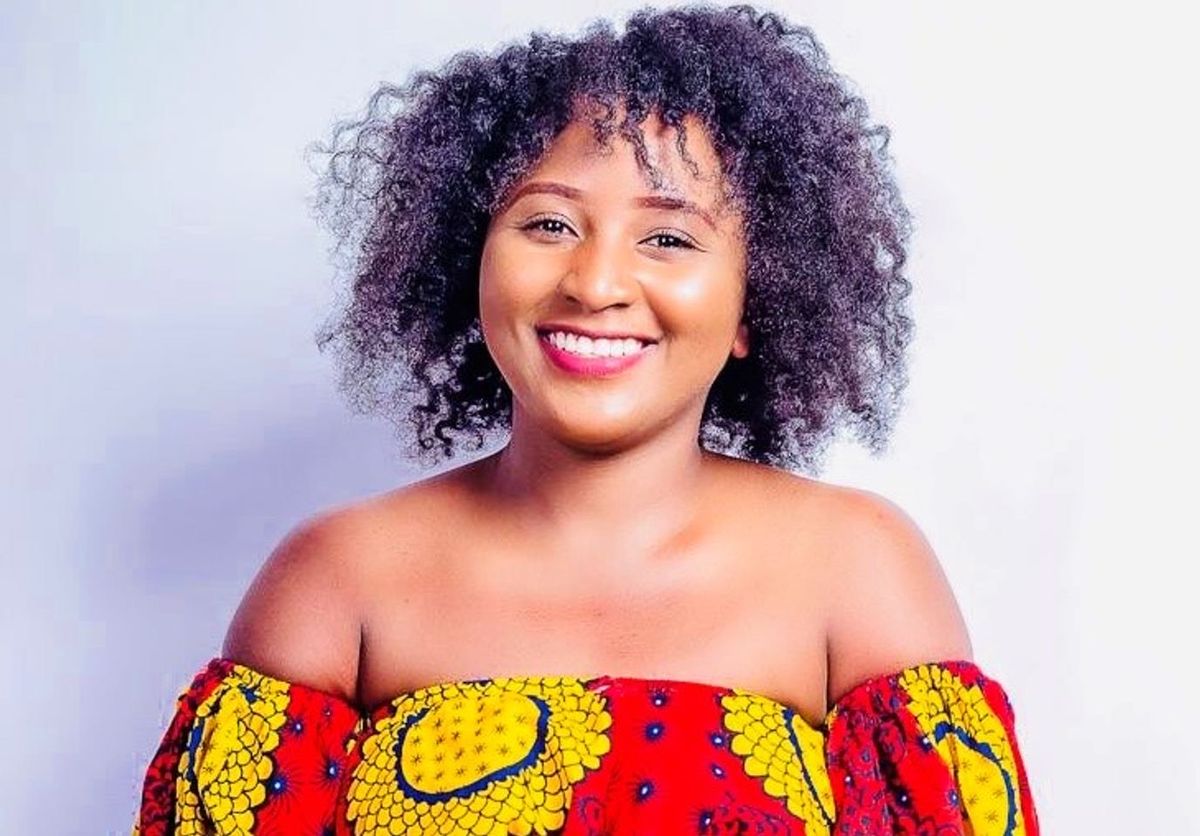I Left My Career as an Economist to Make Feminist Documentaries
Zanji Sinkala was on track for a prestigious corporate lifestyle in Zambia. She gave it all up to raise awareness of the theft of women's land.

Zanji Sinkala is a multimedia journalist and aspiring filmmaker from Zambia. She was named among the world's 100 best young filmmakers by the British Council and was nominated in 2017 for the Zambian Women of the Year Award. Last year, she received the Princess Diana Award for using multimedia journalism influentially in humanitarian work and achieving Sustainable Development Goals with regards to women's rights in Zambia.
I was a high-flying economist when I finished university here in Zambia, set on high-paying jobs; crunching numbers; doing a fundamental analysis on stocks, derivatives, mutual funds; tracking capital marks and companies' Initial Public Offerings (IPOs). I hoped to grab an elite job with great perks, big allowances, a lavish pension, and employee stock options.
I come from a middle-class family where an illustrious education and an "important" job are a yardstick of respectability both in the family and community. In my family, your title walks ahead of you: Dr; Prof; Master’s; PhD. I accepted a monetary outlook on life without questioning. I lived to fulfill my family's high academic and financial expectations. My family members are attorneys, engineers, and dentists. I was fiercely ambitious and aspirational — just like everyone in my family.
Except, I gradually got bored with being fiercely ambitious and having an extremely materialistic approach to life. My job and academic accolades were prestigious, but I felt increasingly soulless, as if I was wandering away from a persistent, inner calling voice that has always laid low inside me: fierce feminism.
As a financial economist, I saw the less glamorous side of the discipline: the reality of development economics and how women in developing countries, like my Zambia, are tied to the financial whims of men.
As a student, I focused on economic models that demonstrated how women in Africa do lots of unpaid labor — unqualified labor like baby feeding, homemaking, cooking, and laundry. This labor was largely not considered work, but so-called "marital duty." I learned that of all state land ownership certificates issued in Zambia yearly, only an average of 20 percent of them go to women. One-third of widows in Zambia lose land (often in violent circumstances) to male relatives when their husbands die.
"As an economist, I saw how women's financial reliance on men in Zambia was keeping our sex trapped in systems of violence."
According to the Zambia Demographic House survey of 2015, Zambian women of 15 years onwards have endured physical beatings, and 30 percent had experienced violence in the 12 years preceding the findings. Violence against women in Zambia, which ranks amongst the worst in sub-Saharan Africa, takes the shape of so-called sexual purification ceremonies, womanhood initiation ceremonies, intimate partner violence, and women´s financial reliance on men.
As an economist, I saw how women's financial reliance on men in Zambia was keeping our sex trapped in systems of violence.
With time, I began to feel guilty about being just another economist serving rampant stock markets while women in my country suffered. I became inspired by my best friend, a pro-bono attorney who fights for women in court when their land has been stolen from them. I decided I needed to apply my financial and mathematical analysis skills to unravelling the gendered nature of land/property ownership in Zambia and violence against women.
When I decided to leave finance, I already had a comfortable life. While some of my family members were supportive, others thought I was making the mistake of my life. I was even more emboldened by their opposition.
I abandoned my prestigious economist job and without another job offer set out to become a documentary filmmaker reporting stories like grabbing of property from defenseless women here in Zambia. I was called silly for setting aside a corporate career to choose "penury" in feminist documentary filmmaking, but the stories I have told since are making a difference.
"Because of the 'lobola' bride price, Zambia's men commonly consider women their 'property.'"
The first sinister arrangement that keeps women financially tied to the leash of men here in Zambia is called "lobola," which is the bride price on wedding/marriage day. A man can date a woman here in Zambia but is not allowed to live with her until he pays something like $4000 and six cattle to her family on the marriage day. On paper, this practice is disguised as appreciation to the family of one's wife. In reality, this has become a double-edged hot rod beating women in Zambia into servitude.
First, because of the "lobola" bride price, Zambia's men commonly consider women their "property." This means married Zambian women have no right to negotiate for safe sex and married women cannot attach their names to assets and properties acquired during marriages. In numerous cases here in Zambia, where women have been fatally harmed by their male partners, men claim that they are defending their honor because "if you pay her bride price, she is your possession."
This became the subject of one of my first multimedia stories: "Pandemic Drives Grabs of Women-owned Properties in Zambia." During the pandemic, Zambian men found a fertile moment to evict widows and their children from family properties knowing the authorities are looking away and that bride price extends "ownership" of a woman beyond her husband to include all members of a husband's family.
I'm still an upstart filmmaker but the reactions I get to my work tell me I'm ruffling feathers. "You're treading on the sensitive ground; perhaps you must stay safe young girl," I always hear such condescending tips disguised as advice. "Troublemakers; being pretentious with American feminism influences; never marry feminists."
In reality, it's the disturbed egos of Zambian men used to set the agenda for women's lives.
I'm proud of the stories of women losing properties that I have filmed. I don't just report the women's distress and move on like the typical media publications. I stay on their story; follow through their court cases and come back to celebrate their small victories when they get their properties back.
I left the glittering world of stock exchanges and a comfortable career to make sure that the financial subjection of women here in Zambia does not go unchallenged. I have no regrets.
4W provides paid writing work for over 50 women in countries spanning the globe. This work is made possible thanks to our paid monthly subscribers. Join today to support our work!
Enter your email below to sign in or become a 4W member and join the conversation.
(Already did this? Try refreshing the page!)





Comments